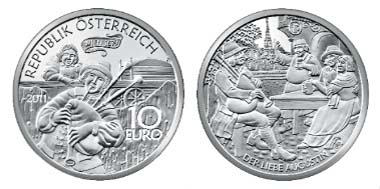October 13, 2011 – The sixth and final coin of the popular “Legends of Austria” silver series was issued on October 13, 2011. The final Legend to be commemorated in this series commemorates a song written in 1679, “Du Lieber Augustin”, which is still used today as inspiration for contemporary entertainment.
The reverse of the coin depicts Augustine playing his bagpipe at an outdoor table of a local pub. All of the people in the design are depicted in period dress. In the background is the main Cathedral of the City of Vienna, St. Stephen’s.
The obverse of the coin shows Augustine as he wakes up just in the nick of time to get out of the pit of plague victims. In the background is a surprised but happy mortician, as well as a cart used to collect victims during this period. This side of the coin also shows the country of issue “Republik Oesterreich” Republic of Austria, the year of issue 2011, and the face value of 10 euros. In the scroll located in the upper center of the design is the date 1679 and “Wien”, or Vienna.
The legend “Du Lieber Augustin” comes from the terrible time of the black plague in the Middle Ages, during which many thousands of people died all across Europe and as well as in Vienna.
Marx Augustin was a musician who performed in public houses and on the street to earn his meagre living. During this time he put together this dark and melancholy song because of all the death and sadness in the town.
“O, my dear friend Augustin, Augustin, Augustin,
O, my dear friend Augustin, I just can’t win!
Money’s gone, girlfriend’s gone, I just can’t win,
Augustin! O, my dear friend Augustin, I just can’t win!
Coat is gone, staff is gone, Augustin’s is lost.
O, my dear friend Augustin, I just can’t win!
Even the town of Vienna, broke like Augustin;
shed tears with thoughts akin, I just can’t win!
Every day was a feast, now we just have the pest
Now all the corpses rest, that is the rest.
Augustin, Augustin, lay down in your grave!
O, my dear friend Augustin, I just can’t win!”
During the Middle Ages towns and cities were dark and dirty. Vienna was no exception. There where no street lights, just an occasional torch or oil lantern. The maze of streets made with cobbles meandered through the town – so sure footing was never really solid. Trash and sanitation was simply dumped into the streets. Adding to these dangers were the large number of deaths, plague victims who dropped dead in the streets. Every day the morticians would collect the corpses. There was no time to bury them individually but rather they were collected and buried in large pits. Once these pits filled up they were covered with lime and earth.
Late one evening Augustin was on his way home after a long day of work and having imbibed a bit too much. The dark and dreary streets were a tricky maze to try and navigate home even under normal conditions. Augustin was exhausted and so he laid down at the edge of a street to get some sleep. He was so soundly asleep that unbeknownst to him he was picked up by the morticians and tossed onto the cart of plague victims. Luckily Augustine woke up in a pit filled with bodies just prior to the pit being covered over with earth. The morticians were more than surprised. But Augustine’s luck had certainly changed. In no time, the rumor spread far and wide that wine was an excellent preventative medicine for the plague.
Augustine who was so grateful for his second chance decided to help out during these difficult times and assist in the clean up and the collecting of many bodies. Sadly, he himself eventually became a victim.
In Austria the song over the years has become the accepted lament for people when they are down and out and have totally run out of luck. Variations of it have been used in classical music by Wranitzky, Schoenberg and Nepomuk Hummel. Even in today’s pop culture variations and lines of this song have been used by many: Bob Hope in “My Favourite Spy”, the Simpsons “The Otto Show”; even the Three Stooges wrote a variation to be used in their skit “Disorder in the Court”, to name just a few. It has been translated into many languages. Many people will also remember the campfire song “Fish and Chips and Vinegar” that uses the melody for yet another variation.
A traditional interpretation of “Du lieber Augustin” proposes a kind of a modern gleeman here.
To the above cited variation by Nepomuk Hummel you can listen to here.





